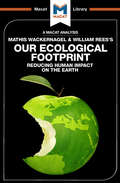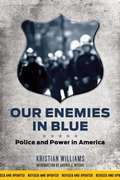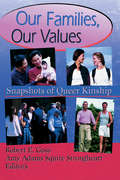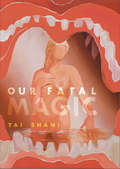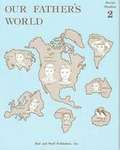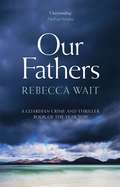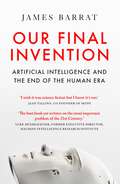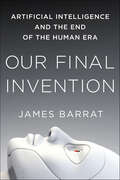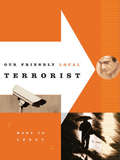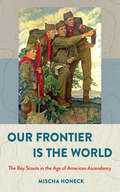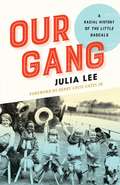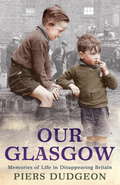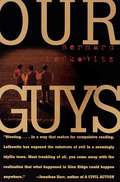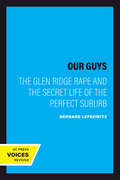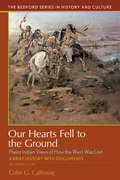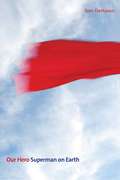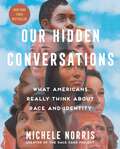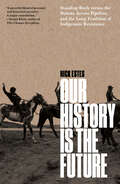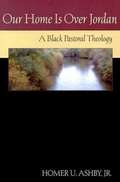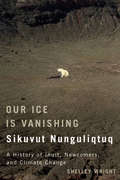- Table View
- List View
Our Ecological Footprint
by Luca MarazziOur Ecological Footprint presents a powerful model for measuring humanity’s impact on the Earth to reduce the harm we are causing the planet before it’s too late. While some people believe we can find a middle ground between environmental conservation and economic development, or that future technological discoveries will solve the problem, the authors warn that our planet’s limited resources simply can’t support an economic system based on unlimited growth. Our Ecological Footprint offers a valuable tool to help us live more sustainably and safeguard our natural resources for generations to come.
Our Enemies in Blue
by Kristian WilliamsLet's begin with the basics: violence is an inherent part of policing. The police represent the most direct means by which the state imposes its will on the citizenry. They are armed, trained, and authorized to use force. Like the possibility of arrest, the threat of violence is implicit in every police encounter. Violence, as well as the law, is what they represent.Using media reports alone, the Cato Institute's last annual study listed nearly seven thousand victims of police "misconduct" in the United States. But such stories of police brutality only scratch the surface of a national epidemic. Every year, tens of thousands are framed, blackmailed, beaten, sexually assaulted, or killed by cops. Hundreds of millions of dollars are spent on civil judgments and settlements annually. Individual lives, families, and communities are destroyed.In this extensively revised and updated edition of his seminal study of policing in the United States, Kristian Williams shows that police brutality isn't an anomaly, but is built into the very meaning of law enforcement in the United States. From antebellum slave patrols to today's unarmed youth being gunned down in the streets, "peace keepers" have always used force to shape behavior, repress dissent, and defend the powerful. Our Enemies in Blue is a well-researched page-turner that both makes historical sense of this legalized social pathology and maps out possible alternatives.Kristian Williams is the author of several books, including American Methods: Torture and the Logic of Domination. He co-edited Life During Wartime: Resisting Counterinsurgency, and lives in Portland, Oregon.
Our Families, Our Values: Snapshots of Queer Kinship
by Robert Goss Amy Adams Squire StrongheartOur Families, Our Values challenges both the gay community and American society to examine carefully the meaning of family values and the nature of social institutions such as marriage and the family. It asks you provoking, even disturbing, questions such as: “Is it prudent for members of the Lavender community to mimic heterosexual marriage or define personal relations networks as families, when these institutions are rapidly collapsing?” “Are we attempting to mainstream American society into accepting different views of marriage and families?” “Are we subscribing to notions of sexual property that are inherent to the marriage ceremony and the institution of marriage, when we choose to be married?” Despite the complexities of this issue, marriage constitutes a privileged position in western society, and, as this book shows you, without the legal recognition of same-sex marriages, there are many fundamental rights, as well as privileges, denied to gay, lesbian, bisexual, and transgendered persons.As Our Families, Our Values turns upside-down the widely accepted notion that only heterosexual people are entitled to get married, have sex, and rear children, you gain insight into personal struggles and affirmations that testify to the spirituality, procreativity, and wholesomeness of the diverse relationships of the Lavender community. You will also learn about various ongoing efforts to give religious pride to the various configurations of gay relationships, families, and values and the disruption of popular interpretations of the Scriptures that have been used to justify the oppression of sexual minorities. This book will intrigue you over and over again, as you read about: value systems transphobia equal marriage rights Buddhism’s rejection of “traditional family values” Brazil’s sex-positive culture differences between gay male social formations and families choosing a language and terms that empower sexual minorities and the essence of the liberation movement sex as communion relationships based on nurture, not transactionDesigned for academics and students of religion, pastors, priests, rabbis, and lay readers alike, Our Families, Our Values is a multifaceted view of the gay community’s response to the public controversy over gay marriage, adoption, and foster care rights. Ideal as a textbook for courses in sexuality, theology, sociology, women’s studies, and gay and lesbian studies, this book will both inform you and delight you as it reminds you that same-sex unions bring much cause for celebration and that religion and homosexuality are not mutually exclusive.
Our Farmers' Market (Places in Our Community)
by Mary MeinkingOur farmers' market is a busy place! Lots of community helpers work at the farmers' market. Readers will learn about who works at a farmers' market, what the workers do, and what makes a farmers' market special. Simple, at-level text and vibrant photos help readers learn all about farmers' markets in the community.
Our Fatal Magic (Strange Attractor Press)
by Tai ShaniFeminist science fiction that anticipates a post-patriarchal future. Our Fatal Magic is a collection of feminist science fiction by contemporary artist Tai Shani. Foregrounding explorations of sensation, experience, and interiority, these twelve fantastical prose vignettes refract their ideas through a series of curious characters, from Medieval Mystics to Cubes of Flesh, from Sirens to Neanderthal Hermaphrodites. Drawing on the speculative narrative strategies pioneered by writers like Marge Piercy, Octavia Butler and others, Our Fatal Magic metabolizes new and necessary fictions from feminist and queer theory to propose an erotic, often violent space of critique in which gender constructs are destabilized, alternative histories imagined, and post-patriarchal futures proposed.
Our Father's World: Grade 2
by Lester Miller Susie Hoover Brenda McdowellA simple Geography course that introduces and explains basic geographical terms and surface features, and introduces the purpose and structure of globes and maps. Twelve of the 30 lessons are stories about children around the world. The meaning and use of the new words used are taught by fill-in-the-blank exercises.
Our Fathers: A gripping, tender novel about fathers and sons from the highly acclaimed author
by Rebecca Wait'A restrained tour-de-force, profoundly unsettling, brilliantly executed, and deeply humane' Emily St. John Mandel, on The Followers'A wonderful novel' Spectator'This is a beautifully realised novel, touching on the fallibility of memory and the unknowability of families, and gripping in its intensity. Outstanding' The Mail on SundayWhat kind of man kills his own family?When Tom was eight years old, his father took a shotgun and shot his family: his wife, his son and baby daughter, before turning the gun on himself. Only Tom survived.He left his tiny, shocked community on the island of Litta and the strained silence of his Uncle Malcolm's house while still a young boy. For twenty years he's tried to escape his past. Until now.Without knowing how to ask, he needs answers - from his uncle, who should have known. From his neighbours, who think his father a decent man who 'just snapped'. From the memories that haunt the wild landscape of the Hebrides. And from the silent ones who know more about what happened - and why - than they have ever dared admit.By turns gripping, beautiful, devastating and tender, Our Fathers is a story about violence and redemption, control and love. With understated compassion and humour, Rebecca Wait gives a voice to the silenced and to the silences between men of few words.
Our Final Invention: Artificial Intelligence and the End of the Human Era
by James Barrat'I wish it was science fiction, but I know it's not.' Jaan Tallinn, co-founder of Skype'If you read just one book that makes you confront scary high-tech realities that we'll soon have no choice but to address, make it this one.' Washington Post Corporations and government agencies around the world have for years been pouring billions into achieving AI's Holy Grail - human-level intelligence. But once AI has attained it, scientists argue, it will have survival drives much like our own. We may be forced to compete with a rival more cunning, more powerful, and more alien than we can imagine.First published ten years ago, Our Final Invention predicted much of the artificial 'intelligence explosion' that is now ripping through our culture, and was named by Elon Musk as one of five books everyone should read about the future. Now with an urgent new preface, James Barrat's landmark work explores the ethics, history and future perils of the heedless pursuit of advanced AI. Until now, human intelligence has had no rival. Can we coexist with beings whose intelligence dwarfs our own? And will they allow us to?
Our Final Invention: Artificial Intelligence and the End of the Human Era
by James BarratElon Musk named Our Final Invention one of five books everyone should read about the future—a Huffington Post Definitive Tech Book of 2013.Artificial Intelligence helps choose what books you buy, what movies you see, and even who you date. It puts the “smart” in your smartphone and soon it will drive your car. It makes most of the trades on Wall Street, and controls vital energy, water, and transportation infrastructure. But Artificial Intelligence can also threaten our existence.In as little as a decade, AI could match and then surpass human intelligence. Corporations and government agencies are pouring billions into achieving AI’s Holy Grail—human-level intelligence. Once AI has attained it, scientists argue, it will have survival drives much like our own. We may be forced to compete with a rival more cunning, more powerful, and more alien than we can imagine.Through profiles of tech visionaries, industry watchdogs, and groundbreaking AI systems, Our Final Invention explores the perils of the heedless pursuit of advanced AI. Until now, human intelligence has had no rival. Can we coexist with beings whose intelligence dwarfs our own? And will they allow us to?“If you read just one book that makes you confront scary high-tech realities that we’ll soon have no choice but to address, make it this one.” —The Washington Post“Science fiction has long explored the implications of humanlike machines (think of Asimov’s I, Robot), but Barrat’s thoughtful treatment adds a dose of reality.” —Science News“A dark new book . . . lays out a strong case for why we should be at least a little worried.” —The New Yorker
Our Fire Station (Places in Our Community)
by Mary MeinkingA fire station helps keep our community safe. Community helpers work hard to keep a fire station running smoothly. Readers will learn about who works at a fire station, what the workers do, and what makes a fire station special. Simple, at-level text and vibrant photos help readers learn all about fire stations in the community.
Our Friendly Local Terrorist
by Mary Jo LeddyOur Friendly Local Terrorist tells the story of the fourteen-year struggle of Suleyman Goven, a Kurd accused by the Canadian Security Intelligence Service of being a terrorist. Mary Jo Leddy was “accidentally” present at Suleyman’’s first interview with CSIS. During that eight-hour ordeal he was propositioned: you work for us as a spy and you’ll get your papers; otherwise—there are no guarantees. Mary Jo continued to be a witness to this bizarre and painful process over the following years at judicial and semi-judicial hearings, which finally ruled that Suleyman ought to be given his papers. This moving personal story explores the efficacy of the immigration and security clearance systems in the Canadian government. It also provides an entry into the (often-complex) political dynamics and pressures within Kurdish communities in Canada and elsewhere in the diaspora, and reveals Turkey’s role and influence in international relations when the tender of huge business contracts is at stake.
Our Frontier Is the World: The Boy Scouts in the Age of American Ascendancy (The United States in the World)
by Mischa HoneckMischa Honeck’s Our Frontier Is the World is a provocative account of how the Boy Scouts echoed and enabled American global expansion in the twentieth century.The Boy Scouts of America (BSA) has long been a standard bearer for national identity. The core values of the organization have, since its founding in 1910, shaped what it means to be an American boy and man. As Honeck shows, those masculine values had implications that extended far beyond the borders of the United States. Writing the global back into the history of one of the country’s largest youth organizations, Our Frontier Is the World details how the BSA operated as a vehicle of empire from the Progressive Era up to the countercultural moment of the 1960s. American boys and men wearing the Scout uniform never simply hiked local trails to citizenship; they forged ties with their international peers, camped in foreign lands, and started troops on overseas military bases. Scouts traveled to Africa and even sailed to icy Antarctica, hoisting the American flag and standing as models of loyalty, obedience, and bravery. Through scouting America’s complex engagements with the world were presented as honorable and playful masculine adventures abroad.Innocent fun and earnest commitment to doing a good turn, of course, were not the whole story. Honeck argues that the good-natured Boy Scout was a ready means for soft power abroad and gentle influence where American values, and democratic capitalism, were at stake. In other instances the BSA provided a pleasant cover for imperial interventions that required coercion and violence. At Scouting’s global frontiers the stern expression of empire often lurked behind the smile of a boy.
Our Gang: A Racial History of The Little Rascals
by Julia LeeIt was the age of Jim Crow, riddled with racial violence and unrest. But in the world of Our Gang, black and white children happily played and made mischief together. They even had their own black and white version of the KKK, the Cluck Cluck Klams—and the public loved it. The story of race and Our Gang, or The Little Rascals, is rife with the contradictions and aspirations of the sharply conflicted, changing American society that was its theater. Exposing these connections for the first time, Julia Lee shows us how much this series, from the first silent shorts in 1922 to its television revival in the 1950s, reveals about black and white American culture—on either side of the silver screen. Behind the scenes, we find unconventional men like Hal Roach and his gag writers, whose Rascals tapped into powerful American myths about race and childhood. We meet the four black stars of the series—Ernie &“Sunshine Sammy&” Morrison, Allen &“Farina&” Hoskins, Matthew &“Stymie&” Beard, and Billie &“Buckwheat&” Thomas—the gang within the Gang, whose personal histories Lee pursues through the passing years and shifting political landscape. In their checkered lives, and in the tumultuous life of the series, we discover an unexplored story of America, the messy, multiracial nation that found in Our Gang a comic avatar, a slapstick version of democracy itself.
Our Glasgow: Memories of Life in Disappearing Britain
by Piers DudgeonThis ebook edition contains the full text version as per the book. Doesn't include original photographic and illustrated material. This oral history of Glasgow spans most of the last century - a time of economic downturn and eventual renewal, in which the many communities making up the city experienced upheavals that tore some apart and brought others closer together. It tells of the beating heart of no mean city in the words of the people who made it what it is. Piers Dudgeon has listened to dozens of people who remember the city as it was, and who have lived through its many changes. They talk of childhood and education, of work and entertainment, of family, community values, health, politics, religion and music. Their stories will make you laugh and cry. It is people's own memories that make history real and this engrossing book captures them vividly.
Our Glasgow: Memories of Life in Disappearing Britain
by Piers DudgeonThis ebook edition contains the full text version as per the book. Doesn't include original photographic and illustrated material. This oral history of Glasgow spans most of the last century - a time of economic downturn and eventual renewal, in which the many communities making up the city experienced upheavals that tore some apart and brought others closer together. It tells of the beating heart of no mean city in the words of the people who made it what it is. Piers Dudgeon has listened to dozens of people who remember the city as it was, and who have lived through its many changes. They talk of childhood and education, of work and entertainment, of family, community values, health, politics, religion and music. Their stories will make you laugh and cry. It is people's own memories that make history real and this engrossing book captures them vividly.
Our Grateful Dead: Stories of Those Left Behind (Posthumanities #65)
by Vinciane DespretAn award-winning exploration of the presence of the dead in the lives of the living A common remedy after suffering the loss of a loved one is to progress through the &“stages of grief,&” with &“acceptance&” as the final stage in the process. But is it necessary to leave death behind, to stop dwelling on the dead, to get over the pain? Vinciane Despret thinks not. In her fascinating, elegantly translated book, this influential thinker argues that, in practice, people in all cultures continue to enjoy a lively, inventive, positive relationship with their dead.Through her unique storytelling woven from ethnographic sources and her own family history, Despret assembles accounts of those who have found ways to live their daily lives with their dead. She rejects the idea that one must either subscribe to &“complete mourning&” (in a sense, to get rid of the dead) or else fall into fantasy and superstition. She explores instead how the dead still play an active, tangible role through those who are living, who might assume their place in a family or in society; continue their labor or art; or thrive from a shared inheritance or an organ donation. This is supported by dreams and voices, novels, television and popular culture, the work of clairvoyants, and the everyday stories and activities of the living. For decades now, in the West, the dead have been discreet and invisible. Today, especially as a result of the Covid-19 pandemic, Despret suggests that perhaps we will be willing to engage with the dead in ways that bring us happiness despite our loss. Despret&’s unique method of inquiry makes her book both entertaining and instructive. Our Grateful Dead offers a new, pragmatic approach to social and cultural research and may indeed provide compassionate therapy for those of us coping with death.
Our Guys: The Glen Ridge Rape and the Secret Life of the Perfect Suburb
by Bernard LefkowitzIn March 1989 a group of teenage boys lured a retarded girl into a basement in Glen Ridge, New Jersey, and gang-raped her. Glen Ridge was the kind of peaceful, affluent suburb many Americans dream about. The rapists were its most popular high school athletes. And although rumors of the crime quickly spread through the town, weeks passed before anyone saw fit to report it to the police. What made these boys capable of brutalizing a girl that some of them had known since childhood? Why did so many of their elders deny the rape and rally around its perpetrators? To solve this riddle, the Edgar award-winning author Bernard Lefkowitz conducted years of research and more than two hundred interviews. The result is not just a wrenching story of crime and punishment, but a hauntingly nuanced portrait of America's jock culture and the hidden world of unrestrained adolescent sexuality.
Our Guys: The Glen Ridge Rape and the Secret Life of the Perfect Suburb (Men and Masculinity #4)
by Bernard LefkowitzIt was a crime that captured national attention. In the idyllic suburb of Glen Ridge, New Jersey, four of the town's most popular high school athletes were accused of raping a retarded young woman while nine of their teammates watched. Everyone was riveted by the question: What went wrong in this seemingly flawless American town? In search of the answer, Bernard Lefkowitz takes the reader behind Glen Ridge's manicured facade into the shadowy basement that was the scene of the rape, into the mansions on "Millionaire's Row," into the All-American high school, and finally into the courtroom where justice itself was on trial.Lefkowitz's sweeping narrative, informed by more than 200 interviews and six years of research, recreates a murky adolescent world that parents didn't—or wouldn't—see: a high school dominated by a band of predatory athletes; a teenage culture where girls were frequently abused and humiliated at sybaritic and destructive parties, and a town that continued to embrace its celebrity athletes—despite the havoc they created—as "our guys." But that was not only true of Glen Ridge; Lefkowitz found that the unqualified adulation the athletes received in their town was echoed in communities throughout the nation. Glen Ridge was not an aberration. The clash of cultures and values that divided Glen Ridge, Lefkowitz writes, still divides the country.Parents, teachers, and anyone concerned with how children are raised, how their characters are formed, how boys and girls learn to treat each other, will want to read this important book.
Our Hearts Fell to the Ground
by Colin G. CallowayThis revised edition of Colin Calloway's Our Hearts Fell to the Ground continues to offer a look into the Native American views of the changing West in the nineteenth century through a selection of primary accounts, speeches, and writings. With a revised introduction and a number of new documents, this second edition now includes new coverage of the Northern Cheyennes' bid for freedom in 1878; a testimony by a Ponca chief who won a landmark court case; an Indian teacher's thoughts on Indian schools; and an old woman's memory of her experience as a teenage girl at the Wounded Knee massacre. The epilogue has been expanded and the bibliography updated to include many of the excellent and path-breaking works that have appeared in the twenty years since the first edition was published. Updated chronology and questions further serve to aid students as they make their way through this rich collection of documents.
Our Hero
by Tom De HavenSince his first appearance in Action Comics Number One, published in late spring of 1938, Superman has represented the essence of American heroism. "Faster than a speeding bullet, more powerful than a locomotive, and able to leap tall buildings in a single bound," the Man of Steel has thrilled audiences across the globe, yet as life-long "Superman Guy" Tom De Haven argues in this highly entertaining book, his story is uniquely American. Created by Jerry Siegel and Joe Shuster in the midst of the Great Depression, Superman is both a transcendent figure and, when posing as his alter-ego, reporter Clark Kent, a humble working-class citizen. An orphan and an immigrant, he shares a personal history with the many Americans who came to this country in search of a better life, and his amazing feats represent the wildest realization of the American dream. As De Haven reveals through behind-the-scenes vignettes, personal anecdotes, and lively interpretations of more than 70 years of comic books, radio programs, TV shows, and Hollywood films, Superman's legacy seems, like the Man of Steel himself, to be utterly invincible.
Our Hidden Conversations: What Americans Really Think About Race and Identity
by Michele NorrisPeabody Award–winning journalist Michele Norris offers a transformative dialogue on race and identity in America, unearthed through her decade-long work at The Race Card Project. <p><p> The prompt seemed simple: Race. Your Thoughts. Six Words. Please Send. <p><p> The answers, though, have been challenging and complicated. In the twelve years since award-winning journalist Michele Norris first posed that question, over half a million people have submitted their stories to The Race Card Project inbox. The stories are shocking in their depth and candor, spanning the full spectrum of race, ethnicity, identity, and class. Even at just six words, the micro-essays can pack quite a punch, revealing, fear, pain, triumph, and sometimes humor. Responses such as: You’re Pretty for a Black girl. White privilege, enjoy it, earned it. Lady, I don’t want your purse. My ancestors massacred Indians near here. Urban living has made me racist. I’m only Asian when it’s convenient. <p><p> Many go even further than just six words, submitting backstories, photos, and heirlooms: a collection much like a scrapbook of American candor you rarely get to see. Our Hidden Conversationsis a unique compilation of stories, richly reported essays, and photographs providing a window into America during a tumultuous era. This powerful book offers an honest, if sometimes uncomfortable, conversation about race and identity, permitting us to eavesdrop on deep-seated thoughts, private discussions, and long submerged memories. <p><p> The breadth of this work came as a surprise to Norris. For most of the twelve years she has collected these stories, many were submitted by white respondents. This unexpected panorama provides a rare 360-degree view of how Americans see themselves and one another. <p><p> Our Hidden Conversations reminds us that even during times of great division, honesty, grace, and a willing ear can provide a bridge toward empathy and maybe even understanding. <p> <b>New York Times Bestseller</b>
Our History Is the Future: Standing Rock Versus the Dakota Access Pipeline, and the Long Tradition of Indigenous Resistance
by Nick EstesHow two centuries of Indigenous resistance created the movement proclaiming “Water is life”In 2016, a small protest encampment at the Standing Rock Reservation in North Dakota, initially established to block construction of the Dakota Access oil pipeline, grew to be the largest Indigenous protest movement in the twenty-first century. Water Protectors knew this battle for native sovereignty had already been fought many times before, and that, even after the encampment was gone, their anticolonial struggle would continue. In Our History Is the Future, Nick Estes traces traditions of Indigenous resistance that led to the #NoDAPL movement. Our History Is the Future is at once a work of history, a manifesto, and an intergenerational story of resistance.
Our Home Is Over Jordan: A Black Pastoral Theology
by Homer U. AshbyHomer Ashby presents a realistic picture of the African American situation with regard to a variety of socioeconomic indices. Using the book of Joshua as his guide, he presents a process of discernment about critical issues facing African Americans and leads readers through a discussion about the assets and liabilities of blackness and a vision for moving over the Jordan into a place where full humanity is realized.
Our Ice Is Vanishing / Sikuvut Nunguliqtuq
by Shelley WrightThe Arctic is ruled by ice. For Inuit, it is a highway, a hunting ground, and the platform on which life is lived. While the international community argues about sovereignty, security, and resource development at the top of the world, the Inuit remind us that they are the original inhabitants of this magnificent place - and that it is undergoing a dangerous transformation. The Arctic ice is melting at an alarming rate and Inuit have become the direct witnesses and messengers of climate change. Through an examination of Inuit history and culture, alongside the experiences of newcomers to the Arctic seeking land, wealth, adventure, and power, Our Ice Is Vanishing describes the legacies of exploration, intervention, and resilience. Combining scientific and legal information with political and individual perspectives, Shelley Wright follows the history of the Canadian presence in the Arctic and shares her own journey in recollections and photographs, presenting the far North as few people have seen it. Climate change is redrawing the boundaries of what Inuit and non-Inuit have learned to expect from our world. Our Ice Is Vanishing demonstrates that we must engage with the knowledge of the Inuit in order to understand and negotiate issues of climate change and sovereignty claims in the region.
Our Ice Is Vanishing / Sikuvut Nunguliqtuq: A History of Inuit, Newcomers, and Climate Change (McGill-Queen's Indigenous and Northern Studies)
by Shelley WrightThe Arctic is ruled by ice. For Inuit, it is a highway, a hunting ground, and the platform on which life is lived. While the international community argues about sovereignty, security, and resource development at the top of the world, the Inuit remind us that they are the original inhabitants of this magnificent place - and that it is undergoing a dangerous transformation. The Arctic ice is melting at an alarming rate and Inuit have become the direct witnesses and messengers of climate change. Through an examination of Inuit history and culture, alongside the experiences of newcomers to the Arctic seeking land, wealth, adventure, and power, Our Ice Is Vanishing describes the legacies of exploration, intervention, and resilience. Combining scientific and legal information with political and individual perspectives, Shelley Wright follows the history of the Canadian presence in the Arctic and shares her own journey in recollections and photographs, presenting the far North as few people have seen it. Climate change is redrawing the boundaries of what Inuit and non-Inuit have learned to expect from our world. Our Ice Is Vanishing demonstrates that we must engage with the knowledge of the Inuit in order to understand and negotiate issues of climate change and sovereignty claims in the region.
